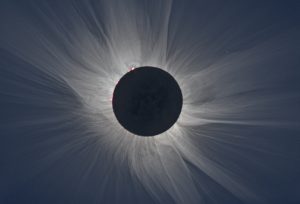So there is going to be a solar eclipse in the US … for those lucky enough to live in or travel to the path of totality it will get dark for a few minutes and for others they’ll see (using appropriate, SAFE glasses or other viewing device) the Moon cover part of the Sun.
So what? Why should we care much about an eclipse?
It’s a phenomena. “Natural phenomena are observable events that occur in the universe and that we can use our science knowledge to explain or predict. The goal of building knowledge in science is to develop general ideas, based on evidence, that can explain and predict phenomena.” From: Using Phenomena in NGSS-Designed Lessons and Units – This is a “MUST READ” (and its only 3 pages.)
For very young students an eclipse is a great way to build their observation skills (and “wonder” skills too) as well as a chance to explain what they saw and experienced … get them started verbalizing! Have them note that the Moon is out during the day and night whereas the Sun is only seen during the day. Have them note how bright the Sun is … it is dangerous bright!
For older students it is a great ABC’s of science (Activity Before Content) opportunity. Go out days before the eclipse and view the Sun with the glasses or viewer and discuss what is seen. Then observe the eclipse and discuss the different stages the Moon and Sun went through – have them draw it in a step-by-step fashion. After they observe can they model what just happened? How did that work? Why doesn’t that happen more often? Instead of just searching the internet for the answers give them sphere’s (styrofoam balls, tennis and ping pong balls…) and flashlights and see if they can recreate the phenomena in the classroom. Don’t front load how an eclipse works or the vocabulary of eclipses … have them figure it out with you facilitating as little as possible. Remember, an eclipse doesn’t happen every month so just having the spheres cast shadows on each other isn’t the entire explanation … what must be true about orbits for them to happen only intermittently? Have them read (and/or read aloud to them or with them) myths, legends and stories about what people have believed was happening (now that their interest has been aroused).
Why do scientists study eclipses? How do they predict when and where they will happen? What do they see and learn from them and why is that knowledge important to us? These are great questions for students to answer.
Ask a scientist … find a scientist/astronomer/expert that you can video-conference in … show him/her the students modeling what they think happens with their spheres and flashlights as well as asking questions and clarifying what they think they learned (more language skills). Ask the s scientist about how and why they became a scientist as well as about some of the cool things they have studied too.
It is a chance to do some Ambitious Science.
Lots more possibilities as well …
REMEMBER – if it’s cloudy it will be live on TV and the internet. Be eye safe and have fun!
Learning is messy!

